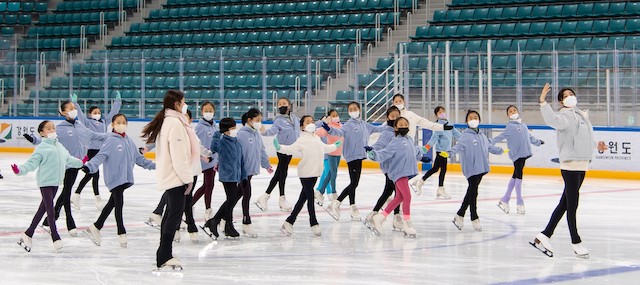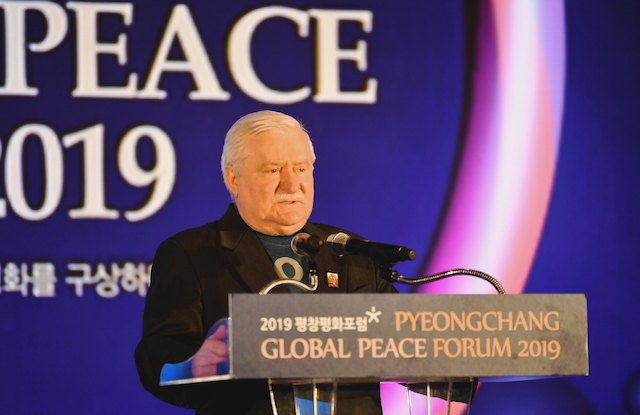[Mar] Legacy of PyeongChang 2018 Olympic Winter Games continues
Date Mar 27, 2022
 Training program organized by the PyeongChang 2018 Legacy Foundation / Courtesy of the PyeongChang 2018 Legacy Foundation
Training program organized by the PyeongChang 2018 Legacy Foundation / Courtesy of the PyeongChang 2018 Legacy Foundation
In 2018, Korea successfully hosted its first Winter Olympics, the PyeongChang 2018 Olympic Winter Games and the 2018 Paralympic Winter Games.
About four years have passed since then, yet the country continues to uphold the Olympic spirit by spreading its vision for sports throughout the world, even against the odds during the COVID-19 pandemic.
Founded by Korea’s Ministry of Culture, Sport and Tourism as well as authorities from Gangwon-do Province in 2019, PyeongChang 2018 Legacy Foundation has been carrying out various activities to promote the values held by the PyeongChang Olympic Winter Games and to contribute to the development of winter sports.
The Dream Program, one of the foundation’s key initiatives, is designed for youth age 13 to 23 from countries lacking in winter sport opportunities or infrastructure. Those invited can experience related sports and Korean culture. So far, the annual program has hosted a total of about 2,398 young people from 95 countries.
This year’s program, held both online (January 17 to 21) and offline (February 14 to 27) in Gangwon-do, invited 142 participants from 37 countries to take part in training for snow and ice sports, including snowboarding and figure and speed skating.
The participants were also given an opportunity to visit major Gangwon-do tourist attractions as well as experience Korean culture through programs that introduced Taekwondo, K-pop and traditional samulnori music.
The foundation also runs camps and academies for local children and young adults to help develop and accomplish their winter-related sports dreams.
The Soohorang and Bandabi sports camps allow participants to learn about Olympic- and sports-based values and to fuel their winter sports aspirations through team trials and training sessions that utilize venues built for the 2018 Olympics and Paralympics.
The sports camps bring together children with and without disabilities to provide an opportunity to raise awareness of disabilities. Last year’s camps invited about 10,000 participants from August to December.
 Nobel Peace Prize laureate Lech Walesa, former president of Poland, speaking during the PyeongChang Global Peace Frum 2019 / Courtesy of PyeongChang 2018 Legacy Foundation
Nobel Peace Prize laureate Lech Walesa, former president of Poland, speaking during the PyeongChang Global Peace Frum 2019 / Courtesy of PyeongChang 2018 Legacy Foundation
Aside from offering the young a stepping stone to achieve their winter sports dreams, the Foundation also runs such events as the PyeongChang Peace Forum and the Imagine Peace Youth Camp to promote peace.
Gangwon-do is divided with the upper third inside North Korea, and the North sent athletes to the 2018 PyeongChang Olympic and Paralympic Winter Games. Consequently, those Games strongly emphasized peace and related values.
The annual PyeongChang Peace Forum aims to act as a global platform for people to explore peace and a sustainable future, bringing together experts, peacebuilders and leaders from around the world.
The Forum was held on- and offline last month. Topics included recent challenges and economic approaches to peace on the Korean Peninsula, the role of sports in strengthening global peace and accomplishing a common agenda in regard to the United Nation’s Sustainable Development Goals.
Speakers included David Beasley, executive director of the United Nations World Food Programme; Jim Rogers, chairman of Rogers Holdings and Beeland Interests; and Na Hee-seung, head of the Korea Railroad Corporation.
Imagine Peace Youth Camp, founded by the International Olympic Truce Centre in Greece, teaches young adults about the legacy of the ancient Olympic Truce as well as its meaning and values.
Around 200 Koreans and local expatriates were invited to this year’s camp. Throughout the three-day event, participants took part in various programs and lectures under the theme of cooperation and communication. They shared ideas and discussions on promoting peace in the international community.
The Foundation also organized the annual PyeongChang Disability Forum to raise awareness of disability issues and equal rights throughout society – not just sports – and to carry on the legacy of the PyeongChang Paralympics. Various policymakers, experts and NGO officials spoke at this year’s March 15 to 17 event, including Vladimir Cuk, executive director of the International Disability Alliance. Topics included infrastructure and labor issues for people with disabilities as well as policies to help create a barrier-free society.
**If you have any questions about this article, feel free to contact us at kocis@korea.kr.**

The Ministry of Culture, Sports and Tourism's "Korea Here & Now" work can be used under the condition of "Public Nuri Type 1 (Source Indication)."




